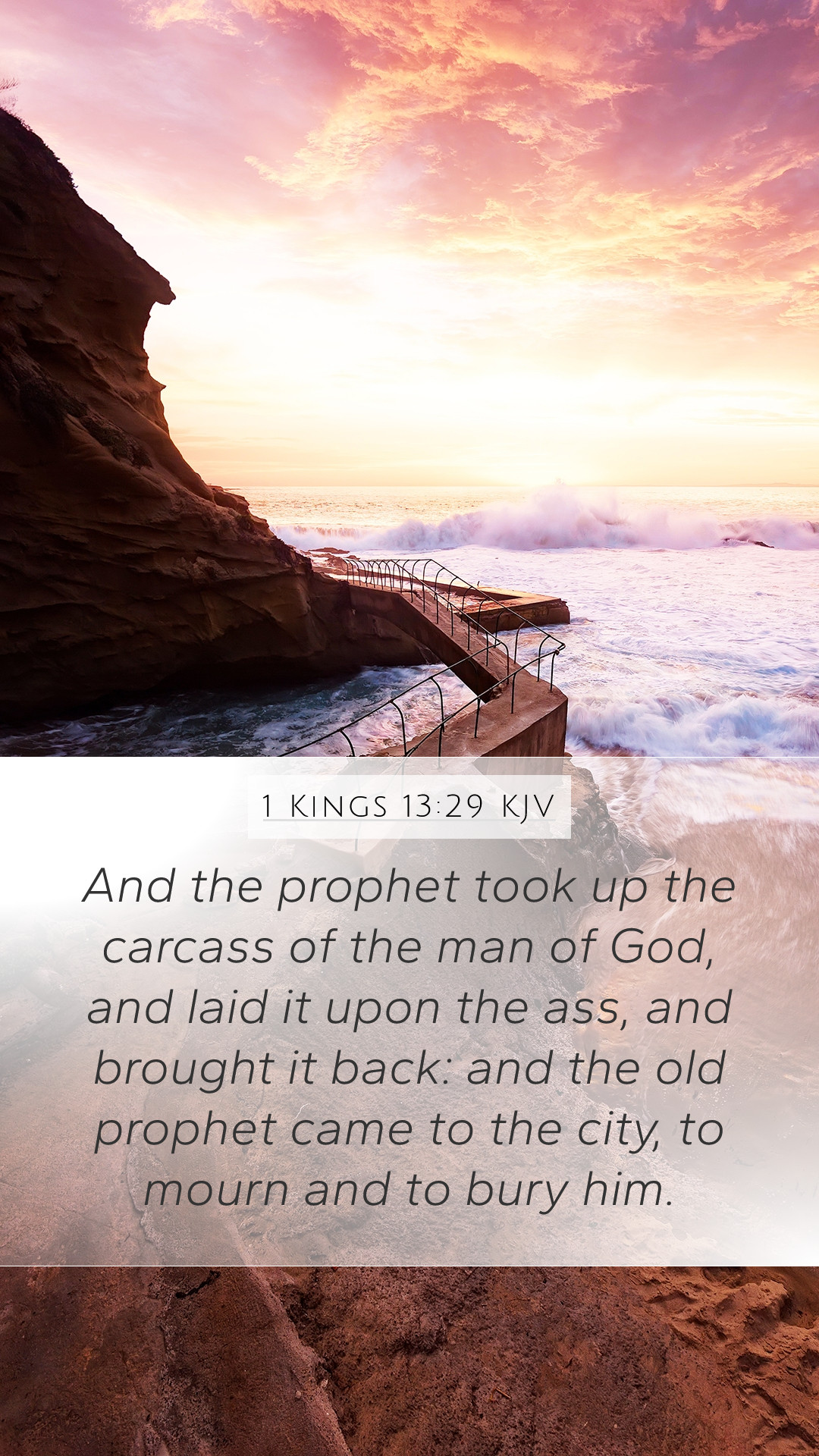Understanding 1 Kings 13:29: A Comprehensive Commentary
1 Kings 13:29: "And the prophet took up the carcase of the man of God, and laid it upon the ass, and brought it back: and the old prophet came to the city, to mourn and to bury him."
This verse concerns a significant event in the life of a man of God and illustrates vital themes found throughout Scripture regarding obedience, prophecy, and divine judgment. Let us delve into an analysis that sheds light on the meaning of this verse, drawing from reputable public domain commentaries.
Context and Overview
The events surrounding 1 Kings 13 take place during a time of great idolatry and apostasy in Israel. The chapter describes the encounter of a prophet from Judah with King Jeroboam, who had turned away from the worship of Yahweh. The man of God speaks a word against the altar in Bethel, bringing God’s judgment against the kingdom of Israel.
Key Themes
- Obedience and Disobedience: The man of God initially obeyed God’s command but later succumbed to the deception of the old prophet.
- Divine Judgment: The death of the man of God serves as a warning about the consequences of ignoring God's instructions.
- The Role of Prophecy: This passage highlights the perilous responsibility of prophets and the weight of their words.
Commentary Insights
Matthew Henry’s Commentary
Matthew Henry notes that this verse marks a pivotal moment in the narrative, emphasizing how the burial of the prophet by the old prophet symbolizes both grief and a recognition of the gravity of disobedience. Henry observes that the bringing back of the carcass shows a deep sense of mourning for one who was used by God, yet faced devastating consequences due to folly.
Albert Barnes’ Notes
Barnes elaborates on the significance of the context leading to this verse, detailing the failure of the man of God to heed divine instruction fully. Barnes encourages readers to consider the solemn reality that even a prophet can fall into error, and this serves as a cautionary tale for all who seek to follow God’s will.
Adam Clarke’s Commentary
Clarke provides a deeper analysis of the actions and motivations of both the man of God and the old prophet. He highlights the importance of understanding that God's grace does not shield individuals from the repercussions of their choices. Clarke emphasizes that the old prophet's actions, while appearing nurturing, ultimately point to a larger lesson on integrity and the importance of staying true to divine guidance.
Lessons and Applications
1 Kings 13:29 provides several vital lessons for believers today:
- Stay Vigilant: The verse teaches the importance of discernment in spiritual matters. Believers are encouraged to be alert to potential deception, even from those who claim to speak for God.
- Embrace Obedience: The man of God's initial obedience contrasted with his later disobedience serves as a reminder to continually align our actions with God's will.
- Recognize Consequences: This narrative illustrates that the consequences of sin can affect not only the individual but also the broader community.
Cross References
To fully appreciate the implications of this verse, consider the following cross-references:
- 2 Kings 23:17: Discusses the fate of the false prophets.
- Jeremiah 14:15: Speaks about the consequences of false prophecy.
- James 1:22: Encourages believers to be doers of the word, not just hearers.
Conclusion
1 Kings 13:29 serves as a profound reminder of the weight of prophecy and the importance of unwavering obedience to God. The insights gained from the commentaries of Matthew Henry, Albert Barnes, and Adam Clarke aid in understanding Scripture in a deeper light, revealing the significance of this passage for individual believers and the collective body of Christ.
Further Study Recommendations
For those interested in deeper biblical study and analysis, consider exploring:
- Bible study guides and tools to better understand historical contexts.
- Online Bible study courses focusing on prophecy and narrative analysis.
- Engaging with Bible study groups that discuss the implications of Scriptures like 1 Kings 13.


